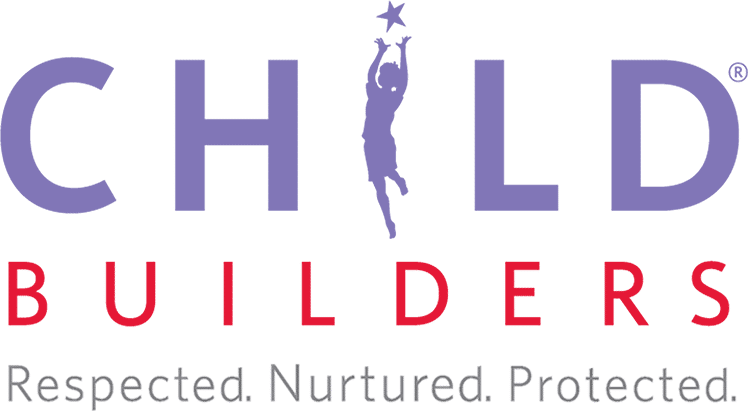For Presenters
How do I log in?
1. Determine if you are already logged in by looking at the top line of any page you are viewing on our website. If you see "Log In" at the top right corner of the page, you are logged out. If you see "Log Out" at the top right and your name at the top left, you are already logged in.
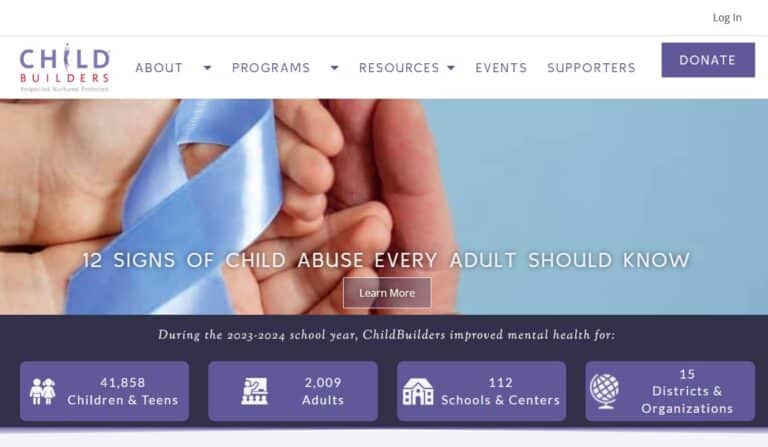
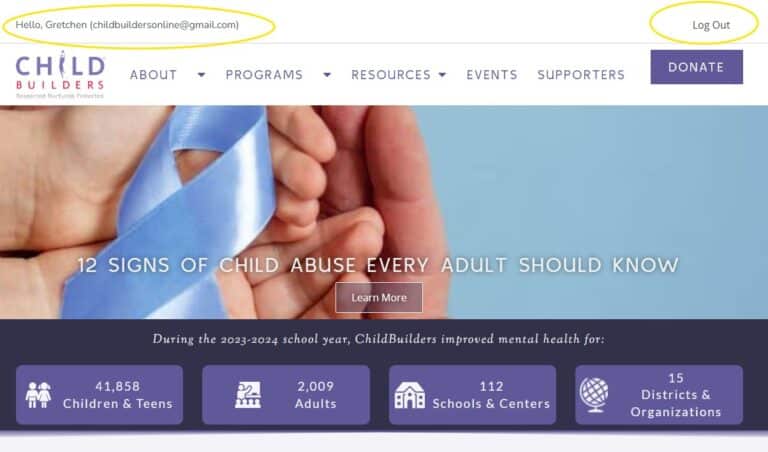
Log In
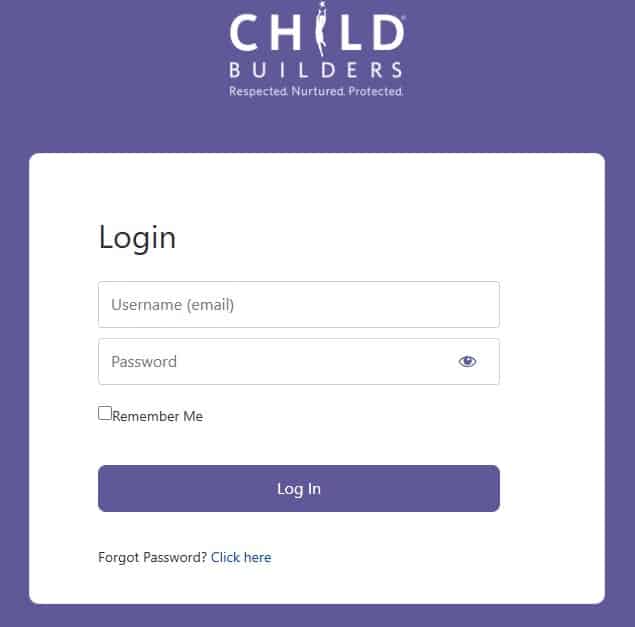
In most cases, your username is your school email. Your password was set up when you first received access to the curriculum.
If you need to reset your password, click on the words "Click here" at the bottom of the login form.
Request Password Reset
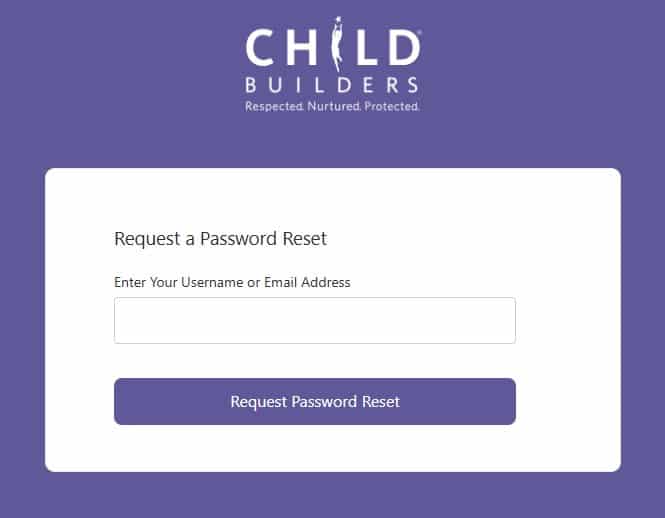
Enter your username in the space. In most cases, your username is your school email. If you have trouble finding your username, contact us for assistance. Click "Request Password Reset" and check your email for an email from ChildBuilders Online with a unique link.
Choose a New Password
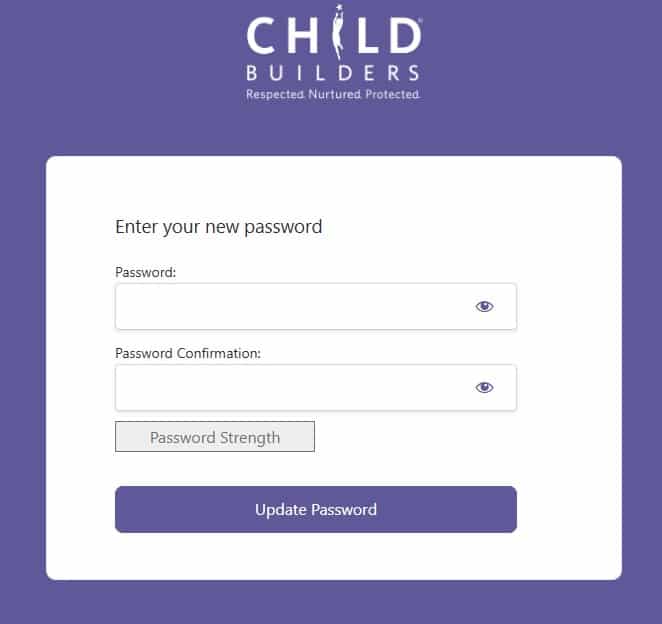
After you click on the link in your email, you will be redirected to a page that looks like this. Enter a new password of your choosing in both spaces provided, ensuring the entries match. Take note of your new password, then click Update Password.
I don't see my curriculum materials when I log in - what's going on?
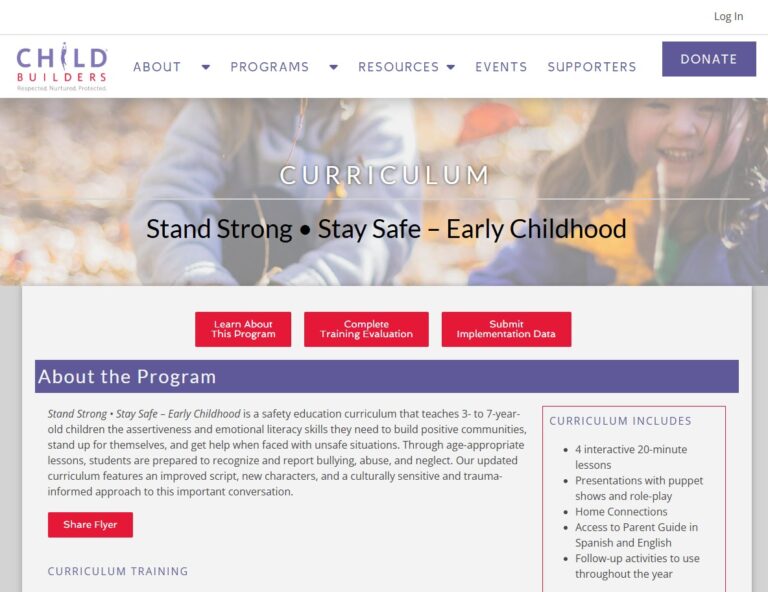
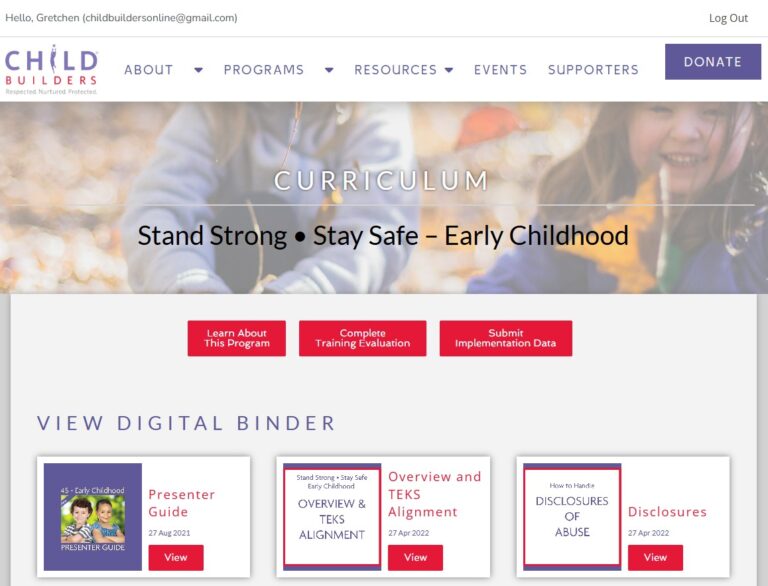
Here are some common reasons you might not see your materials.
- You aren’t logged in. Check to make sure you can see your name at the top left corner of the screen and the words “Log Out” at the top right.
- You aren’t logged into the correct account. Check that your username visible at the top left corner of the screen is the correct account.
- You are logged in, but you are viewing a cached (saved) version of the page. Your browser sometimes tries to cut down on page loading time by showing you a cached version of the page. If you are certain you are already logged in but you are not seeing your name or the words “Log Out” at the top, this might be the case. Try navigating to the page you want to view, then click the button to refresh or reload the page. This reminds the browser to load the page properly instead of using a cached version.
- Your access to your materials has expired. If you can see your name at the top of the page and verified that you are logged into the correct account, you might be unable to view your materials because your access is expired. This happens if it has been more than 3 years since your last training or if there is an error in the system. Please contact us so we can help solve this issue.
Why do I need to send in data sheets every year?
Your data and feedback make it possible for ChildBuilders to strengthen our programs and secure the funding needed to continue serving schools across our community.
Every year, we compile data about how our programs are used in the community to 1) measure our impact, 2) communicate our success to our supporters and potential funders, and 3) determine next steps for improving our programs. We appreciate the time it takes for our presenters to complete the data sheets and are grateful for the direct feedback we receive from the field.
How do I submit my annual data sheets?
For each program you are trained in, please complete the corresponding data sheet.
You are welcome to complete these forms as soon as you are finished presenting your ChildBuilders' lessons for the year. If we have not heard from you, we will send email reminders in April and May of each year.
Can I review videos of the puppet shows to prepare for teaching 4S Early Childhood?
Yes! Videos of each 4S Early Childhood lesson are available as part of your curriculum materials for that program. To access the videos, log into your curriculum and navigate to the lesson you want to prepare. The video should load in the page. Please contact us if you have any issues viewing the videos.
Please note, these videos are intended for your review and are not to be used with students. If you are interested in videos to use with students, please contact us to discuss this option.
I still need help. What are my options?
We are here to help! Please reach out to our team anytime. Call the office, Send an email, or Use this form.
For Administrators
Is parental permission required to teach Stand Strong • Stay Safe?
Stand Strong • Stay Safe is a resilience-building curriculum designed for children in Pre-Kindergarten through 5th grade. Through this program, students gain essential knowledge and skills that support mental health and promote personal safety at home, at school, and in their communities.
The curriculum helps children learn to advocate for themselves and others, manage their emotions, recognize and respect the feelings of others, resolve conflicts peacefully, establish and maintain healthy personal boundaries, and make safe and respectful choices about friendships. A key component of the program also empowers children to recognize, avoid, and seek help if they encounter situations involving child abuse or neglect.
In accordance with the Texas Education Code Sec. 28.004, any school-based program that addresses the prevention of child abuse, family violence, dating violence, or human trafficking must have prior parental permission. Because Stand Strong • Stay Safe includes content that helps children identify and prevent child abuse and neglect, schools must obtain parental consent before presenting these specific lessons.
Please note: It is the responsibility of the school and/or school district to ensure compliance with Texas Law. Our recommendation is based on our interpretation of the statutes but does not substitute for the advice of a lawyer.
Parental permission is NOT REQUIRED for:
- Lesson 1: Assertiveness
- Lesson 2: The Power of Kind Words
Parental permission IS REQUIRED for:
- Lesson 3: Keeping My Body Safe
- Lesson 4: Stopping Neglect and Physical Abuse
For Lower Elementary/Foundation (Comics/Videos)
Parental permission is NOT REQUIRED for
- Lesson 1: Be Assertive
- Lesson 2: Boundaries and Consent
- Lesson 5: Emotional Safety
Parental permission IS REQUIRED for
- Lesson 3: Physical Abuse
- Lesson 4: Sexual Abuse
For Upper Elementary/Extension (PowerPoint & Scenarios)
Parental permission is NOT REQUIRED for
- Lesson 1: Safe Relationships
- Lesson 2: Emotional Control
- Lesson 3: Handling Conflict
- Lesson 5: Stay Safe Online
Parental permission IS REQUIRED for
- Lesson 4: Stopping Abuse
How does Stand Strong • Stay Safe benefit schools?
Research Supports Our Approach
- Confident, assertive children who have a strong social support network and know how to get help are undesirable victims (National Center for Missing and Exploited Children,1999).
- The Protective Factors Framework emphasizes the importance of social connections as a key strategy to reduce the incidence of child abuse and neglect in families
- Individuals who perpetrate child sexual abuse are more likely to target children who are unlikely to stand up for themselves or get help (Rispens, Aleman & Goudena, 1997).
- According to Dominguez (2013), people who bully also seek out passive victims.
- Assertive behavior is an antidote to bullying and other forms of victimization; it encourages kids to be “upstanders” instead of passive bystanders and paves the way for them to set and communicate clear boundaries. Passive and aggressive responses to bullying behavior tend to encourage it, while assertiveness diffuses it (CASEL, 2009).
Key Benefits for Students & Schools
- Supports a comprehensive developmental counseling program and positively affects:
- Individual Health,
- Classroom Climate, and
- School Culture.
- Systematically teaches personal and interpersonal skills identified by TEKS and student competencies indicated in the Texas Model for Comprehensive School Counseling.
- Interpersonal skills (deal with others) : Active listening, emotional intelligence, effective communication, social skills, leadership skills, conflict resolution, negotiation, and teamwork.
- Intrapersonal skills (Deal with you): Self-care, self-awareness (know your strength and shortcoming), integrity, self-regulation, know and manage your emotions, resilience, self-discipline.
- Fosters a positive classroom climate and school culture. Skills learned in Stand Strong • Stay Safe classes can be referenced and reinforced during office referrals and other schoolwide discipline efforts.
- Reduces trauma and builds resilience.
- Aligns with current Health TEKS.
- Supports character development programs like Character Counts.
- Promotes compliance with Texas State Law stating that schools must:
- Provide anti-victimization education (TEC 38.004).
- Implement a strategy for raising awareness about sexual abuse prevention and other child maltreatment (TEC 38.0041).
Is there an overview I can share with my team?
The following resources may help provide additional information to your team as you are deciding whether a partnership with ChildBuilders would be a good fit.
